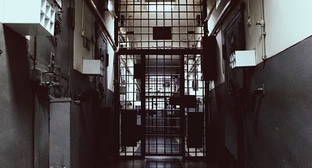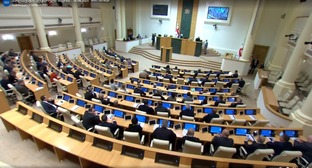09 February 2015, 09:00
Week in the Caucasus: review of main events of February 2-8
Aggravation of situation in the area of the Karabakh and Armenian-Azerbaijani conflict; attack on advocate in Dagestan; arrest of current and former vice-governors in Krasnodar Territory; start of sending Ukrainian refugees from Rostov Region to other regions of Russia; detention of 11 former employees of Georgia's MIA on suspicion of resonant past murder; public utility accidents in Volgograd Region, which left residents without heat and power, – see the review of these and other events in the Caucasus during the week of February 2-8, 2015, prepared by the "Caucasian Knot".
Aggravated situation in Karabakh and Armenian-Azerbaijani conflict zone
At the end of last week the situation escalated; and reports arrived both about shootouts and about victims of ceasefire violations. On February 5, as a result of shelling, Karmir Akhbyur, 60, a resident of the village of Nergin, Tavush Region of Armenia, was killed on the Armenian-Azerbaijani border; and on February 4, an 85-year-old resident of the village of Movses of the same district was wounded. On February 5, a woman from the village of Alibeyli, Tovuz District of Azerbaijan, was wounded in her arm; and on the same day, two soldiers – one from the Defence Army of the Nagorno-Karabakh Republic (NKR) and the other – from the Armed Forces of Azerbaijan – were killed in the Karabakh conflict zone.
According to the NKR's Defence Army, on February 1-7, Azerbaijanviolated the ceasefire in the conflict zone for more than 1200 times. The Azerbaijani Ministry of Defence (MoD) reported about everyday shelling of its positions in different sections of the frontline by the Armenian party. On February 7, the Organization for Security and Cooperation in Europe (OSCE) expressed its concern about the situation on the frontline of the parties of the Karabakh conflict; and on the eve of that day, the co-chairs of the Minsk OSCE Group urged the leaders of Azerbaijan and Armenia to resume their dialogue.
Lawyer who cooperated with HRC "Memorial" beaten up in Dagestan
The lawyer Murad Magomedov, who cooperates with the Human Rights Centre (HRC) "Memorial", was beaten up on February 4 in Makhachkala. He was attacked by several men right at the building of the Supreme Court of Dagestan, after which Murad was hospitalized in grave condition. Magomedov himself, according to his friend, associated the attack with his participation as an advocate in the case related to the explosion, which killed the religious leader Said-Afandi of Chirkey and six of his parishioners. Magomedov represents the interests of the accused Amirkhanov, who refused to plead guilty right on the day, when his advocate was attacked. The last thing that Magomedov could remember was the end of the session; but he cannot remember what happened afterwards. The police said that the victim cannot be interrogated because of his health condition.
Vice-governor and former vice-governor arrested in Krasnodar Territory
On February 2, Alexander Ivanov, a former vice-governor of the KrasnodarTerritory, and Vadim Lukoyanov, the Minister of Natural Resources and a vice-governor of the Territory, were detained. It became known only on February 4 from sources close to the power agencies, but no reason for the detention was disclosed. On the same day, the courts ruled to arrest Lukoyanov and Ivanov for two months; both sessions took place behind closed doors. Vyacheslav Potapov, a member of the Krasnodar Public Oversight Commission (POC), said that he visited Vadim Lukoyanov at SIZO (pre-trial prison) No. 5 of the Department of the Russia's FSB in Krasnodar. According to Potapov, the detainee said that he was accused under Part 2, Article 201, of the Russian Criminal Code (abuse of power). According to unofficial data, Ivanov is prosecuted for the same reason.
Refugees from Ukraine are sent to other regions of Russia from Rostov Region
On February 2, Vasily Golubev, the Governor of the Rostov Region, reported an extension of the emergency regime in the region, because of the inflow of refugees from Ukraine, which has increased since December 2014; he instructed the heads of municipalities to prepare additional space to accommodate refugees. By February 5, the region had set up 31 temporary accommodation centres (TACs), which housed over 3000 persons. On January 29, Sergey Ivanov, the head of the Russian presidential administration, asked governors of other Russian regions to help the Rostov Region, which had faced a new wave of migrants, and to start accommodating refugees. On February 6, Rostov began sending migrants to other regions: on that day, over 70 of them took trains to Izhevsk, Vladimir and Ryazan.
Eleven former MIA detained on suspicion of old resonant murder in Georgia
On February 2, inGeorgia, three former employees of the Ministry of Internal Affairs (MIA) were detained, including Irakli Pirtskhalava, the former deputy chief of the MIA's criminal police. They were detained in connection with the investigation into the murder by policemen in May 2006 of Zurab Vazagashvili. In the evening of the same day, the spokesman of the General Prosecutor's Office (GPO) of Georgia said that the investigation into the murder of Vazagashvili was over; and the detained former MIA officials are under threat of the supreme punishment. On February 3, it became known that in total 11 former MIA employees had been detained and charged. However, the figurants refuse to plead guilty. It is noteworthy that the resignation on January 24 of Alexander Chikaidze, the head of the MIA, had to do with the Vazaganishvili's murder: he motivated his resignation by the accusations against him that he had allegedly sheltered the killers.
Public utility accidents in Volgograd Region leaving residents without heat and power
The past week was marked by several major public utilities accidents in the Volgograd Region. At night on February 2, breaks of power lines left residents of the Zhirnov, Kamyshin, Kumylzhen and Kletsky Districts of the Region without electricity. On February 2, an emergency power disconnection occurred in the Svetloyar, Dubovsky and Olkhovsky Districts. The accidents, which, according to authorities in the region, were caused by hurricane winds, fog and wet snow and left residents of some 50 dwelling settlements of the region without electricity supplies, were completely eliminated in the morning on February 3. Also, in the morning on February 3, the Dzerzhinsky District of Volgograd was struck by a rupture of the main pipeline, which left the district residents without hot water and heat. The affected area includes 135 high-rise buildings of the micro-district "Seven Winds" and about 30 socially important facilities. The eliminating of the accident took 16 hours. In the afternoon on February 4, 12 apartment buildings, as well as a kindergarten and school in the Traktorozavodskoy District of Volgograd remained without hot water and heating as a result of another accident on the pipeline. The accident was eliminated only by the evening of the same day.





Комментирование через Кавказский узел